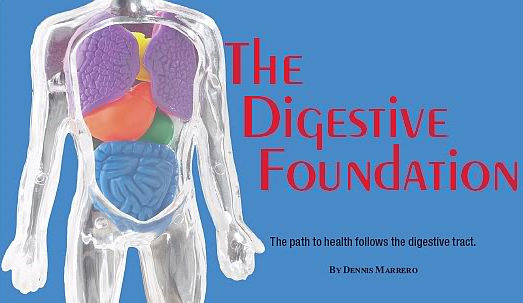The retailers, consumers, manufacturers and suppliers who make up the natural products industry all have one common concern: health. Whether through food, supplements, meditation or exercise, these lifestyle-minded individuals choose natural because they believe their health will benefit from their actions.
Still, some fail to see that the body’s systems, if not working properly, can cancel out these efforts. This is especially true for the digestive system. Says Michel Sirgent, senior vice president of sales and marketing for Bio-K+ International, Inc., Laval, Quebec, Canada, “Consumers visit healthfood stores for wholesome, less-processed food, nutritional supplements and natural remedies,” but “these things are only properly used by the body if digestion and nutrient absorption are optimal.”
Many of your customers may not understand the importance of proper digestion. “Retailers,” suggests Sirgent, “need to be more insistent with their customers that natural health is built on a foundation of digestive health.”
 Maday Labrador, MS, director of technical services at Enzymedica, Inc., Port Charlotte, FL, agrees that the importance of digestive health is often overlooked. “The Chinese have a saying, ‘Disease enters through the mouth,’” says Labrador. “Indeed, we are only as healthy as the nutrients we take in and are able to digest, process and assimilate…Poor digestion,” she adds, “leads to foods not being broken down into the basic building blocks needed to rebuild cells and create energy for the body.”
Maday Labrador, MS, director of technical services at Enzymedica, Inc., Port Charlotte, FL, agrees that the importance of digestive health is often overlooked. “The Chinese have a saying, ‘Disease enters through the mouth,’” says Labrador. “Indeed, we are only as healthy as the nutrients we take in and are able to digest, process and assimilate…Poor digestion,” she adds, “leads to foods not being broken down into the basic building blocks needed to rebuild cells and create energy for the body.”
To address this issue in your store, a retailer should utilize the flood of literature from digestive health companies as well as mainstream media. Mary Adams, vice president of marketing at NextFoods, Boulder, CO, says, “Visual elements can attract attention but also consider training all the natural living staff on digestive health, which is rapidly taking the spotlight from cardiac health as consumers become more aware of how they can influence their own overall health by paying attention to their gut health.”
Guardian of Health
This relationship between digestive health and overall health starts with the body’s first line of defense: the immune system. Brenda Watson, president and founder of ReNew Life Formulas, Clearwater, FL, explains, “Nearly 75% of the body’s immune defenses are located in the digestive tract. There, trillions of beneficial bacteria (probiotics) work constantly to crowd out the harmful bacteria that would otherwise proliferate and cause poor health and disease.”
To illustrate the digestive system’s importance to immune health to your customers, Gaetano Morello, BSc., N.D., a member of Green Bay, WI-based Enzymatic Therapy’s scientific board, says the body should be looked at as a home in need of protection. “Where would you put the guards?” he asks. “At the front door and in the windows, because those are the entry points. Your immune system is located in the gut because it’s one of the biggest entry points in the body.”
 Specifically, the most common way digestion impacts the immune system is through nutrient availability, explains Nena Dockery, technical resources manager at National Enzyme Company, Forsyth, MO. “If food isn’t broken down into its smallest components, vital nutrients cannot be absorbed into circulation where they are needed…for all of the body systems, including the immune system.”
Specifically, the most common way digestion impacts the immune system is through nutrient availability, explains Nena Dockery, technical resources manager at National Enzyme Company, Forsyth, MO. “If food isn’t broken down into its smallest components, vital nutrients cannot be absorbed into circulation where they are needed…for all of the body systems, including the immune system.”
Besides nutrient availability, Dockery adds, “improperly broken down food fragments can stress the immune system in other ways.” For instance, she says, “large, undigested food (particularly protein) fragments can trigger a gastrointestinal (GI) response and in some cases even an inflammatory response from the immune system.” She also notes that these fragments may be absorbed through the intestinal wall due to damage.
Neil E. Levin, CCN, DANLA, nutrition education manager for NOW Foods, Bloomingdale, IL, adds, “The body’s way of dealing with undigested protein remnants from incomplete digestion is to ‘release the hounds!’ (sic ‘em with immune cells), and you have a recipe for immunoreactive foods (food sensitivities).”
Other reactions may also ensue with improper digestion. Morello describes a patient of his that was suffering from eczema (a skin condition caused by inflammation) on her hands. After reviewing her records, he noticed that she was prescribed a histamine-2 antagonist drug, which is used to reduce the amount of acid produced in the stomach. This, he explains, can have negative effects because it will make the stomach more alkaline allowing everything to pass more easily through the digestive system without breaking them down, including bad bacteria. This may cause damage to the intestinal mucosa, the innermost layer of the gastrointestinal tract, and “lead to holes in the intestinal mucosa causing ‘leaky gut,’” explains Morello. “Now, large food particles will enter into the blood stream and create an immune reaction, which, in this case, was eczema.” After treating her gut for two months with deglycerized licorice root, enzymes and probiotics, his patient’s condition went away.
 Levin says that natural health practitioners like Morello know that much of the immune system is located in the GI tract, but this may not be common knowledge to your clientele. Conditions that seem removed from digestive health, such as eczema, may in fact be directly related to improper digestion. Clearly explaining this to your customers may get them to rethink the importance of this system.
Levin says that natural health practitioners like Morello know that much of the immune system is located in the GI tract, but this may not be common knowledge to your clientele. Conditions that seem removed from digestive health, such as eczema, may in fact be directly related to improper digestion. Clearly explaining this to your customers may get them to rethink the importance of this system.
Preventing an Upset
Stomach problems have consistently made the list of top reasons for a doctor’s visit in the United States. The Center for Disease Control’s National Center for Health Statistics reported in its 2006 National Ambulatory Medicare Survey that stomach issues accounted for over 16 million of these visits (1). But, Morello notes, “All of us have suffered from indigestion at one time or another.” This makes proper digestion a concern for 100% of your clientele.”
“We are constantly assailed by factors that look to compromise [the body’s] inner balance and that is an avenue to illness,” says Frank Hodal, president of Vidazorb, Beltsville, MD, “from the hardly noticeable to the mildly annoying to the chronic and life threatening.”
Richard Passwater, president of research and development at Solgar Vitamin and Herb, Leonia, NJ, says that aging also has a lot to do with digestive health. “The aging process significantly affects the balance of the digestive system. As we age, most of us have a decrease in ability to efficiently digest food thoroughly and absorb nutrients efficiently.”
 Adams of NextFoods explains, “As a person ages, the good bacteria in the gut starts to deteriorate faster, thus allowing harmful bacteria to colonize the intestines. Without preventative steps such as taking probiotics, the balance starts to tip toward the colonizers, which lead to temporary or chronic digestive problems and immune problems that are cause by poor gut health.”
Adams of NextFoods explains, “As a person ages, the good bacteria in the gut starts to deteriorate faster, thus allowing harmful bacteria to colonize the intestines. Without preventative steps such as taking probiotics, the balance starts to tip toward the colonizers, which lead to temporary or chronic digestive problems and immune problems that are cause by poor gut health.”
Another factor older consumers should be aware of, says Levin, is that “aging tends to reduce stomach acid, an important immune barrier and digestive aid which also sets the proper pH for probiotic bacteria like acidophilus (literally translated as ‘acid loving’).”
Nevertheless, preventative measures can support any age group’s digestive health. “Although many people dismiss impaired digestion as a simple fact of life,” says Watson of ReNew Life, “the truth is that the majority of digestive issues are caused by poor diet and lifestyle choices and can be remedied easily through a commitment to proper nutrition and healthy living.”
Constipation. Enzymedica’s Labrador agrees that lifestyle is most often the main culprit of digestive problems. “Specifically,” she says, “eating in a hurry, high-fat diets, stress, inactivity and not enough enzyme-rich, live foods.” For instance, she says, constipation can best be managed with lifestyle changes. “Diets with too much refined carbohydrates and fat, too little raw foods, water intake and insufficient exercise can cause constipation. Along with changes in diet,” she adds, “digestive enzymes are often used to relieve constipation by improving the digestion of foods, therefore improving normal elimination.”
|
Drugs and Digestion We’ve all heard those stereotypical drug commercials that highlight the benefits of a certain drug, followed by a long list of side effects normally including digestive issues. While drugs are necessary for certain conditions, individuals on prescription medication or taking over-the-counter products should be aware of the impact they may have on digestion. As far as medicating digestive disorders specifically, says Vincent Annunziata with Jarrow Formulas, Los Angeles, CA, drug therapy should be viewed as a last resort. “Unfortunately, many people and doctors are unwilling and impatient to try lifestyle modification or alternative treatments and resort to a pharmaceutical approach to digestion sooner rather than later.” Acid Blockers. Perhaps the most commonly used digestion aids are acid blockers or antacids, which provide quick relief from heartburn. Nena Dockery with National Enzyme Company, Forsyth, MO, explains that acid facilitates the breakdown of foods in the stomach and activates enzymes necessary for digestion. Antacids neutralize this gastric acid to allievate temporary discomfort. However, she notes, continued usage can raise the stomach’s pH (making it less acidic) and the body’s natural process may release more acid to compensate, thus worsening heartburn. It may also lead to sensitivities and allergies because food will not properly breakdown. “Finally,” she adds, “the absorption of vitamins and minerals particularly iron, folic acid, calcium and B12, may be impaired.” Antibiotics. Michel Sirgent with Bio-K+ International Inc., Laval, Quebec, Canada, notes antibiotics “kill not only bad bacteria but the healthy gut flora as well.” The overuse of antibiotics, he adds, “has led to new “superbugs’ that become resistant to antibiotics.” This makes the intestinal tract vulnerable to pathogens, as well as fungal organisms such as candida, adds Dockery. NSAIDs. Non-steroidal anti-inflammatory drugs have also been shown to have negative digestive effects. For one, NSAIDs may damage the lining of the stomach and increase the risk of ulcers and infections. They have also “been long implicated in gastrointestinal bleeding and GERD,” says Dockery. |
Watson notes that a lack of fiber and essential fatty acids [EFAs] also plays a part. “Fiber is necessary because it adds bulk to the diet, and a healthy colon requires bulk to eliminate regularly.” In addition, she says, “Fiber strengthens and tones the muscles in the colon by giving them something to push against, in turn stimulating peristalsis (the natural muscle contractions that move food through the intestines) ensuring regular, healthy elimination.” Heavily processed and sugary foods typical in the American diet may also sit and ferment in the colon, Watson explains, because they lack the enzymes necessary to break down. This can produce dangerous toxins, but, she says, “Fiber has been shown to absorb and eliminate those toxins via the stool.”
The role of the EFAs omega-3 and omega-6 in healthy bowel elimination is that they “provide needed nourishment to the cells along the intestinal tract, and they help to soothe and lubricate the bowel to ensure smooth elimination without painful pushing or straining,” says Watson.
GERD. Another common condition affecting millions of Americans is gastroesophageal reflux disease (GERD), also known as acid reflux or heartburn.
“Indigestion and heartburn,” says Passwater, “are common signs of inefficient digestion.” He adds that inefficient digestion often leads to “the beginning of a downward spiral that decreases the amount of needed nutrients reaching our cells, which results in disorders and disease just as if the dietary intake per se was decreased. GERD, more specifically, is a type of chronic heartburn that many develop, he says, and can lead to more serious issues such as Barret’s Syndrome and esophageal cancer.
Several factors can cause heartburn symptoms, says Ryan Doheny, principal at Natrica USA, LLC, Los Angeles, CA, with diet being the biggest factor. “We all have stomach acid for a reason,” he explains. “Sometimes, we overeat or we digest certain things that cause the acid to float up into your esophagus.” This is when people experience the heartburn or gastric reflux. Other triggers, he adds, include smoking and alcohol consumption.
There are also genetic ties to acid reflux, but James Gibbons, president of Nature’s Plus, Melville, NY, has issues with labeling any condition as inherited, because, he says, it makes individuals believe the consequences are unavoidable. Highlighting an August 2003 study published in the journal Gut, Gibbons says, “43% of acid reflux is genetically caused…but more importantly, this finding means that 57% of cases are environmentally caused” (2). Therefore, “most people can likely avoid acid reflux by changing their environment; changes such as lifestyle or diet,” he says.
Watson agrees that GERD, like constipation and other digestive disorders, can be prevented with simple steps. “These include chewing your food thoroughly and not gulping down liquids while eating, which can dilute the natural enzymes found in foods.” Enzymes in raw whole foods, she explains, break down foods in small particles assisting digestion. “This in turn enhances the absorption of important nutrients from those foods. For this reason,” she adds, “leading digestive-care experts recommend taking a natural digestive enzyme supplement with every meal to ensure superior digestion.”
Allergies and Sensitivities. Levin of NOW Foods says, “People who eat foods that ‘don’t agree with them’ suffer the consequences. In extreme cases, inflammatory conditions of the GI tract create difficulties in absorbing nutrients,” he says. “These are frequently the result of undiagnosed allergies, sensitivities and intolerances that prevent food from being completely digested.”
 Sirgent of Bio-K+ adds, “The youngest baby-boomers and generation X-ers are particularly vulnerable to chronic digestive disorders [like GERD]. This is evident by the growing number of drugs (acid blockers) in drug stores as well as the ever-growing number of free foods: dairy free, soy free, gluten free, corn free.”
Sirgent of Bio-K+ adds, “The youngest baby-boomers and generation X-ers are particularly vulnerable to chronic digestive disorders [like GERD]. This is evident by the growing number of drugs (acid blockers) in drug stores as well as the ever-growing number of free foods: dairy free, soy free, gluten free, corn free.”
What’s more, consumers who regularly take antacids to combat their sensitivities or allergies can unknowingly disrupt the digestion process further. For instance, protein digestion will ideally begin in the stomach through the action of the enzyme pepsin, says Dockery of NEC. “Pepsin,” she explains, “requires acidic conditions in order to be active and is inactive at pH levels above around 4.0.” If drugs lower the stomach’s acidity, thus raising its pH above 4.0, protein digestion must be accomplished in the small intestines with pancreatic and intestinal enzymes. “Incomplete protein digestion may occur,” says Dockery, “potentially leading to an increase in some food allergies.”
Autoimmune. There are 80 different types of autoimmune diseases and many have similar symptoms, making it hard to diagnose. However, these chronic illnesses involve almost every organ system. Women, especially African American, Hispanic and Native American, are prone to the diseases (3). Specifically, autoimmune conditions occur when the immune system cannot distinguish between healthy body tissue and antigens resulting in an immune response that destroys normal body tissues. The response is hypersensitivity reactions (similar to allergies) to substances the immune system would normally ignore (4).
 Allergens, infectious agents or other factors may also lead to an autoimmune response and more serious digestive issues, says Dockery. While she admits, “Irritable bowel diseases such as Crohn’s Disease and ulcerative colitis have a possible genetic predisposition…the exact triggering mechanism is unknown.” But, she says, “Something causes the body to wage an immune response within the intestine.”
Allergens, infectious agents or other factors may also lead to an autoimmune response and more serious digestive issues, says Dockery. While she admits, “Irritable bowel diseases such as Crohn’s Disease and ulcerative colitis have a possible genetic predisposition…the exact triggering mechanism is unknown.” But, she says, “Something causes the body to wage an immune response within the intestine.”
As in all digestive disorders, lifestyle decisions weigh heavy on health. Enzymatic Therapy’s Morello notes that the overuse of antibiotics may play a pivotal role in certain autoimmune conditions. Popular drugs are used to rid the body of infection, but they do not discriminate between “good” and “bad” bacteria, which results in an imbalance.
Dockery agrees, “These good bacteria are critical to proper digestive system and immune system functioning and are a critical barrier in preventing many ingested toxins from being absorbed into systemic circulation.” She adds, “Other medications such as NSAIDS damage the delicate lining in the stomach, increasing the risk for ulcers and other infections.”
Other theories say that certain microorganisms may also trigger changes in the body, particularly in those prone to autoimmune disorders (4). Supporting immunity (by supporting the digestive system) may prevent this immune system malfunction. WF
References
- D. K. Cherry, et al., “National Ambulatory Medicare Survey, 2006,” National Center for Health Statistics (3) August 6, 2008.
- I. Mohammed, et al., “Genetic Influences in Gastro-Oesophageal Reflux Disease: A Twin Study,” Gut. 52(8), 1085–1089 (August 2003)
- U.S. Library of Medicine and the National Institutes of Health, www.nlm.nih.gov/medlineplus/autoimmunediseases.html, accessed November 10, 2008.
- U.S. Library of Medicine and the National Institutes of Health, http://www.nlm.nih.gov/medlineplus/ency/article/000816.htm, accessed November 10, 2008.
Published in WholeFoods Magazine, 2008
|
The Essential of Digestion While diet and lifestyle play the most important roles in proper digestion, supplementation is essential for optimal health. Richard Passwater, Ph.D. with Solgar Vitamin and Herb, Leonia, NJ, attests, “The health of our digestive systems can be maintained and our digestive ability restored by utilizing dietary supplements including digestive enzymes, probiotics and fibers.” These three, in particular, are the staples of digestive health. Passwater notes, however, that everyone is different and “should work with their healthcare practitioner to identify their individual needs.” Probiotics Enzymes Fiber Added Support |









